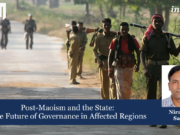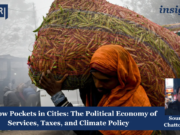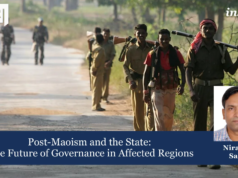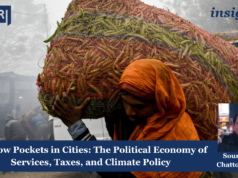Policy Update
Omkar Shelar
The Centre of Excellence in AI for Education was announced in the Annual Financial Statement (FY 2025-26) with a budgetary allocation of ₹500 crores to transform the education landscape into AI-aided teaching, personalised education and skill development. Five National Centres for skilling in AI, robotics and cybersecurity shall be set up to address the requirements of the industry worldwide in curriculum designing, training of trainers, skill certification and periodic assessments in order to make the workforce of India globally competitive. An attempt has been made to understand the challenges and outreach of this initiative by looking into other Centres of Excellence in healthcare, agriculture and sustainable cities. Under these initiatives, projects were undertaken like AgriHub and CERCA.
The AI CoE for Education is expected to drive innovations in pedagogy. For this, several recommendations have been put forth by experts. Recommendations like mutual partnerships with private institutions to facilitate further AI adoption beyond the excellent institutions, introduction of AI-centric modules at different levels of education, etc. By 2027, the AI workforce in India is estimated to double to 1.25 million. At this crucial juncture, this initiative is a strategic intervention towards AI-ready education, global AI leadership while recognizing AI as a global public good and enhancing employability.
Introduction :
A Centre of Excellence is an institution that provides leadership, best practices, and support for training in any specific area of concentration. They are created in India for performing innovations, enhancing skill development, and addressing sector-specific challenges with collaborative efforts between the government bodies, the academia, and industry partners. Literally, the Centre of Excellence means- A place where the highest standards are maintained. The establishment of a CoE should have a clear purpose and must follow a strategic roadmap.
The Union Budget 2025-26 gives an assertive push to the educational and technological transformation in this direction with the announcement of the Centre for Excellence in Artificial Intelligence for Education. The five proposed National Centres for skilling and upskilling are expected to drive educational innovation through AI integration for both educators and learners, improving the quality of education and employability. As of February 2025, the Indian Government has yet to announce the names of the institutions that will be designated as ‘National Centres’ for CoE in AI for education. This CoE aims to position India as a key player in the global AI ecosystem by aligning skilling and upskilling with global expertise.
Analysis :
Some precedent-setting examples in AI for Education are evident from the establishment of three Centres of Excellence with interest in health, agricultural and sustainable cities. Leading institutions such as IIT Delhi, IIT Ropar, and IIT Kanpur were tasked with establishing AI-driven research and development hubs. An apex committee headed by Sridhar Vembu put these CoEs in place with an impetus from the top-most academic institutions. The Centre for Excellence for Research on Clean Air (CERCA), established on 1st April 2018, has been formed to address the air pollution and climate challenges, particularly in Delhi NCR. Thus far, CERCA has completed many projects in cooperation with organizations such as the World Bank, NASA, and industrial partners, aimed at developing air quality monitoring and emission reduction strategies. IIT Ropar is involved in AI applications to agriculture for increasing productivity and sustainability. IIT Kanpur is also leading AI city research for sustainable cities which address problems like energy forecasting, air quality, urban flooding, and transportation management. The IIT Indore AgriHub for Sustainable Agriculture has begun operations during the inauguration on 27th January 2025.
In this backdrop, with the announcement of the Union Budget, Finance Minister Shri Nirmala Sitharaman ji stated the setting up of a CoE in AI for Education with an allocation of ₹500 crores. The CoE for AI in education seeks to permit the personalization of learning, better the assessment system and improve the teacher training process. India’s AI sector is thus growing tremendously-from the current 60,000-650,000 AI professionals to more than 1.25 million by 2027 at a CAGR of 15% as cited by Nasscom-this makes the setting up of this CoE most timely. While the CoEs that were announced earlier were setting the ground for AI-driven innovations in India, the initiation of the CoE for education further enhances India’s credentials as the world leader in AI, thus keeping the country at the forefront of AI-enabled learning and workforce development.
The five National Centres of Excellence have been developed in partnership with global players for Skilling with industry relevant skills which are aligned with the “Make for India, Make for the World”initiative. The partnerships will include curriculum-making, trainer-trainer programs, certification, and periodic assessments to ensure adherence to international standards. The budget also proposes the up-gradation of 1,000 Industrial Training Institutes to benefit about 2 million youth. This endeavor is expected to lead to the further strengthening of the vocational education framework, allow teaching of practical skills to students, and enhance their chances for gainful employment.
Challenges :
The establishment of the Center for Excellence in Artificial Intelligence for Education is a major initiative of the Indian budget of 2025, with a significant allocation of ₹500 crores that can greatly change the educational scenario. However, the successful implementations of this mission can face different challenges, some of which are mentioned below.
- Talent Shortage: The contrary to the case is that there is an evident shortage of AI talent in the country, leading India to fail in realizing the benefits of the CoE. An important prerequisite in this case is a substantial investment in developing AI-centric education and training.
- Data Availability and Quality: Effective AI applications depend on diverse high-quality datasets. In education, the biggest opposition to this is data compilation and standardization while ensuring privacy and security.Also, R&D investments in India historically have been less in AI. Hence, continued funding and policy support from the government fetch solutions to innovations and also catch up with global progress.
- Infrastructure Constraints: While adopting AI solutions, good digital infrastructure is necessary. The required resources such as high-speed internet and modernized computing facilities can be afield for many educational institutions, especially in rural areas.
- Ethical and Regulatory Considerations: It raises issues of data privacy, algorithmic bias and technology ethics when using AI in education. Thus, clear guidelines and regulatory frameworks ought to be established.
All the said challenges call for collective approaches on the part of government bodies, educational institutions, industry stakeholders and community efforts toward achieving the success of this initiative’s objectives by the CoE.
Recommendations :
- Nirvaan Birla, Managing Director of Birla Open Minds Education Pvt Ltd, has highlighted the need to streamline Public-Private Partnership (PPP) models for upskilling and simplify regulatory frameworks for Ed-tech. He emphasizes the importance of collaboration between technology firms, educational institutions, and startups to leverage diverse expertise and resources. When selecting the five National Centres, it is crucial to address the digital divide and avoid focusing solely on top-tier elite institutions while neglecting those on the periphery—whether geographically or otherwise. A more effective approach would be to foster inter-university collaborative projects. Such initiatives would combine logistical efficiencies and the expertise of top-tier researchers with insights from regional universities, ensuring a more inclusive and well-rounded perspective at the grassroots.
- An introduction of AI-focused modules and courses into present educational systems will avail learners to develop skills relevant in this age. All this should not seem purely the addition of AI as a subject since the terminology calls for changes and optimization in curriculum design and teaching methodologies. Thus, it should be oriented toward improving ways to teach and apply AI rather than just the introduction of one isolated module. The goal is “Integration of AI” rather than just its “Introduction”.
- Dr. Ramakrishnan Raman, Vice Chancellor of Symbiosis International University recommended that while expanding IITs and AI driven education is transformative, vision must include support for private and deemed universities, which provide 90% of higher education in India12. Large scale projects and pilot experiments shall be inclusive since beginning and must extend support beyond premier institutions. Inter-University collaborative efforts shall be advanced and appreciated.
- Preparing the workforce for AI-fuelled economies will require adaptability and future-ready skills. National Centres of Excellence for skilling might provide greater immediate returns than just relying on global partnerships. Reskilling with AI Skills is strategic competition with the increasingly huge number of internationally qualified professionals in crucial sectors.
- Research and development are also essential for sustaining AI-based education systems. Through the introduction of a “‘Deep Tech Fund of Funds’” with a corpus of ₹20,000 crore, the next generation of emerging startups will be enabled to convert their visionary ideas into viable innovations. Such a funding model in AI directed at education can enable a strong foundation for future development in the area.
References :
- https://www.indiabudget.gov.in/doc/budget_speech.pdf?utm_
- https://pib.gov.in/PressReleasePage.aspx?PRID=2064990
- https://pib.gov.in/PressReleasePage.aspx?PRID=2097808#:~:text=IIT%20Indore%20inaugurated%20AgriHub%2C
- https://www.businessworld.in/article/budget-2025-govt-to-establish-ai-edcuation-coe-for-rs-500-cr-546686
- https://ird.iitd.ac.in/IRD/CoE-e-Book.pdf
- https://www.computerweekly.com/news/366618470/India-Budget-Tech-takes-centrestage-with-AI-and-infrastructu
- https://timeso-ndia.indiatimes.com/business/india-business/budget-2025-industry-expert-shares-the-reforms-o-er-a-visionary-push-for-education-and-skill-development/articleshow/117891949.cms?
- https://cxotoday.com/corner-office/the-budget-verdict-what-experts-are-saying
- https://time.com/7012817/ashwini-vaishnaw/
- https://education.economictimes.indiatimes.com/news/industry/ai-and-skill-development-take-center-stage-in-budget-2025-26-industry-reactions/117854286
- https://carnegieendowment.org/research/2025/02/the-missing-pieces-in-indias-ai-puzzle-talent-data-and-randd?center=india&lang=en
About the Contributor: Omkar Shelar is a policy researcher at IMPRI and a postgraduate student of Public Policy and Governance at the Tata Institute of Social Sciences, Hyderabad with a keen interest in Data driven policy making and analysis.
Acknowledgement: The author extends sincere gratitude to Dr Arjun Kumar and Aasthaba Jadeja for their invaluable guidance and support.
Disclaimer: All views expressed in the article belong solely to the author and not necessarily to the organisation.
Read more at IMPRI:
Eradicating TB: India’s Race Against Time
Mahatma Gandhi National Rural Employment Guarantee Act 2005: A Cornerstone of Rural Development



















